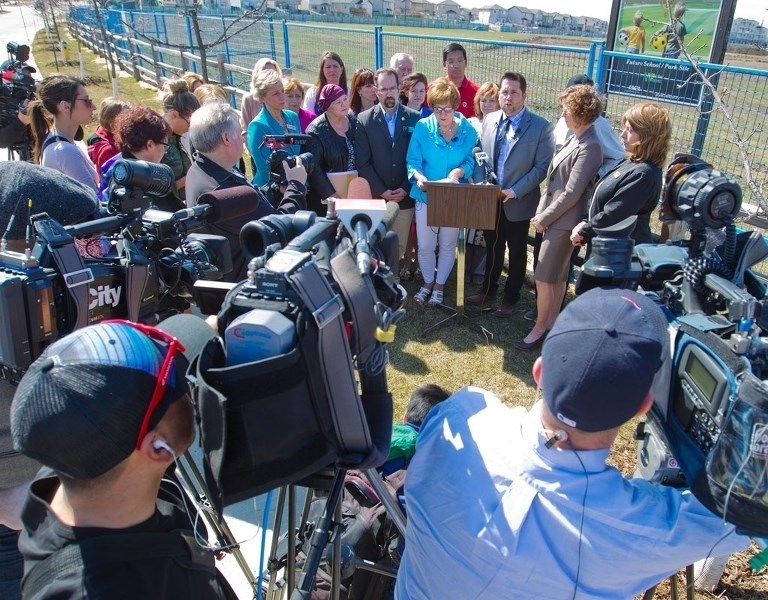Alberta school boards warned the province this week that its latest budget could force them to lock up new schools before students can even get in them.
In a rare move, 19 Alberta school boards representing about 65 per cent of Alberta’s students held joint press conferences in Edmonton and Calgary Monday to protest the province’s decision to not fund new students that enrol in local schools in the next three years.
The 2015 provincial budget, which is now on hold due to the provincial election, states that the province will not give boards more money if they have more students this fall than they did last year. This funding freeze is meant to last three years.
Edmonton Catholic Schools is looking at 1,849 new students this fall, said board chair Debbie Engel. It will be short $12.1 million as a result of the freeze.
Edmonton Public Schools is expecting at least 2,500 new unfunded students, board chair Michael Janz said.
“Even at the low end, that’s equivalent to 100 new classrooms full of students.”
St. Albert Public expects to have at least 300 more students this fall and will have two new schools in the near future, said board chair Cheryl Dumont.
“They have to be staffed and have to be ready, and where are those dollars going to come from?”
While they could tap their reserves to do this, they might not be allowed to since they need explicit permission from Alberta Education to do so, Dumont said. Even if they do, those reserves would cover school operations for a year at most.
“Are we looking at deficit budgeting?” she asked.
The boards argued that the freeze would reduce the per-pupil funding for all students and increase class sizes. Elk Island Public Schools chair Trina Boymook spoke on how she heard the “gut-wrenching” news last week that one of her schools would have to grow its kindergarten classes to 28 students each from 18 this fall due to the cuts.
The budget also cuts cash for special needs, English as a second language and aboriginal students, Engel said – her board will have about $1 million less for these this fall.
And many aboriginal and English-learning students will also be new students this fall, meaning they’ll be unfunded.
“We see that as a double-whammy,” Engel said.
John Tomkinson, chair of Saint Thomas Aquinas Roman Catholic Schools (which covers the area between Edmonton and Red Deer), said that his board had 3,500 students and expected to get 1,400 more in two years.
“That’s not funded and it’s completely unsustainable and unattainable.”
The board currently has reserves enough to run its schools for about 3.5 days, Tomkinson said. They’re getting two new schools, but he questioned how they’d find the cash to pay for the staff and students in them.
“If the funding doesn’t come through for the operations in two to three years of enrolment growth freeze, we may end up with situations across the province where boards are forced to have to padlock the doors on new capital developments before they’re opened to children.”
The budget is asking boards to give more students the same level of education for less money, Engel said.
“This just is not possible.”
The freeze would mean bigger classrooms and overworked teachers, neither of which would help make students into strong future leaders, Janz said.
The boards called on Albertans to ask electoral candidates about their education policies during this campaign, and called on the province to fund new students.
“We are asking, desperately asking, that new enrolment for students in Alberta be funded,” Engel said.
How schools are funded
The province took over collection of property taxes to fund schools in 1994, explains Michael Brenneis, secretary treasurer for the St. Albert Public board. <br />Ever since, it’s funded schools on a per-pupil basis. You get a base grant for each student in your district, plus additional grants for elements such as aboriginal or special-needs students.<br />Separate school boards (such as Greater St. Albert Catholic) can “opt out” of this arrangement by collecting school tax money directly from local governments, he continued. It’s a symbolic move, as the city simply hands over the money it would have given to the province to the board and the province gives the board extra cash to bring them up to the same level as everyone else. <br />“The net effect is you get the same amount of money.”<br />Boards can levy taxes of up to three per cent, but those taxes must be approved by voters in a plebiscite held during a municipal/trustee election. Brenneis did not know of any board that had successfully passed such a levy.




